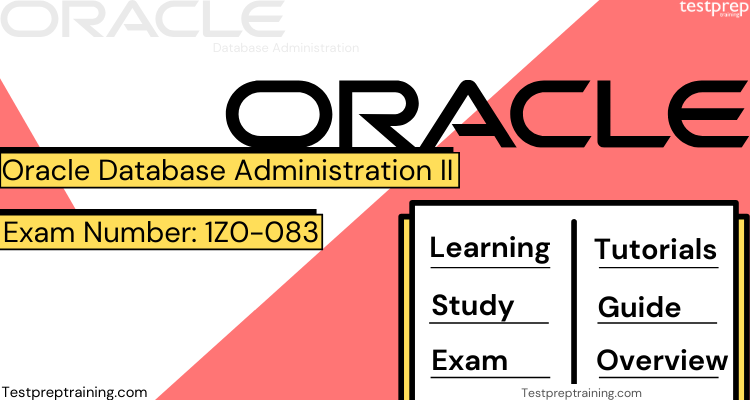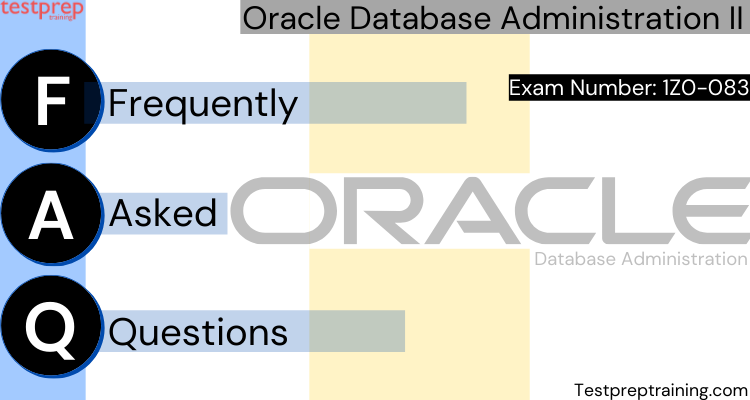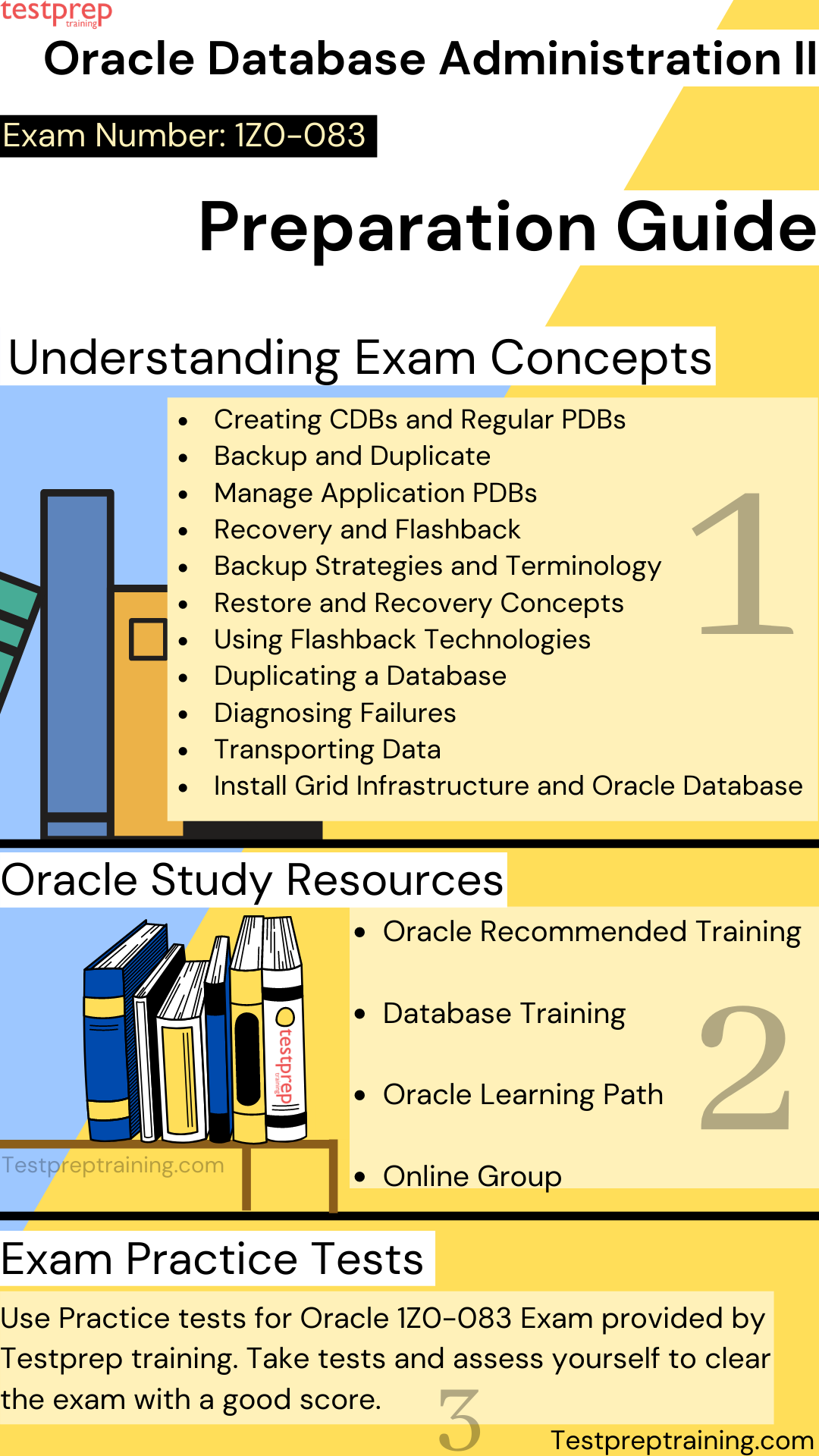1Z0-083 | Oracle Database Administration II

Oracle Database Administration II (1Z0-083) exam will help candidates to become Oracle Database Administration 2019 Certified Professional. They are professionals with theoretical understanding and skills required for configuring and managing Oracle Databases up to and including Oracle 19c. Moreover, in this candidates will gain the skills and knowledge for –
- Installing, patching and upgrading Oracle Database
- Oracle Grid Infrastructure for a standalone server
- Creating and managing a backup and recovery strategy using Recovery Manager (RMAN)
- Using RMAN for Database duplication and transportation
- Diagnosing failures using RMAN
- Managing all aspects of Multitenant container databases, pluggable databases and application containers including the creation
However, passing this part 2 exam in a 2 exam path proves candidates’ skills in installing, upgrading, patching, SQL programming skills, database and network administration, and backup and recovery. Moreover, the candidates can demonstrate fluency with some advanced skills such as multi-tenant, SQL performance monitoring, and problem determination.
Target Audience
- Production Database Administrators (DBAs)
- Development DBAs
- DB Architects
- DB designers and analysts
Oracle Database New Features
Oracle Database new features will help in improving the potential as an Oracle 11g, 12c, 12c R2 or 18c DBA. However, the new features include:
- Leveraging enhancements in Multi-Tenant so you can optimize your data
- Managing Database Security at multiple levels
- Using and understanding RMAN concepts
- Improving Performance
- Learning how Big Data and Data Warehousing can benefit you
- Sharding Enhancements implementations
Oracle 1Z0-083: Exam Details
The Oracle 1Z0-083 exam consists of 85 questions that are of type multiple-choice. Candidates will be given 150 minutes to complete the exam. However, to pass the exam, it is necessary to score a minimum of 57%. The exam will cost you $245 USD.

Exam Scheduling
Candidates can schedule for the Oracle 1Z0-083 exam by paying directly with a credit card, or redeem a voucher if purchased from Oracle. Or, they can schedule it through Oracle external testing provider, PearsonVue.
Course Structure

Topic 1: Creating CDBs and Regular PDBs – Oracle Database: Managing Multitenant Architecture Ed 1
- Configuring and create a CDB
- Creating a new PDB from the CDB seed
- Exploring the structure of PDBs
Topic 2: Backup and Duplicate – Oracle Database: Managing Multitenant Architecture Ed 1
- Performing Backup and Recover CDBs and PDBs
- Duplicating an active PDB
- Duplicating a Database
Topic 3: Manage Application PDBs – Oracle Database: Managing Multitenant Architecture Ed 1
- Explaining the purpose of application root and application seed
- Defining and creating application PDBs
- Installing, upgrading and Patching applications
- Creating and administering Application PDBS
- Cloning PDBs and Application containers
- Plugging and unplugging operations with PDBs and application containers
- Comparing Local Undo Mode and Shared Undo Mode
Topic 4: Recovery and Flashback – Oracle Database: Managing Multitenant Architecture Ed 1
- Restoring and Recovering Databases with RMAN
- Performing CDB and PDB flashback
Topic 5: Backup Strategies and Terminology – Oracle Database: Backup and Recovery Workshop
- Performing Full and Incremental Backups and Recoveries
- Compressing and Encrypting RMAN Backups
- Using a media manager
- Creating multi-section backups of very large files
- Creating duplexed backup sets
- Designing archival backups
- Backing-up of recovery files
- Backing-up non database files
- ASM metadata backup
Topic 6: Restore and Recovery Concepts – Oracle Database: Backup and Recovery Workshop
- Employing the best Oracle Database recovery technology for your failure situation
- Describing and using Recovery technology for Crash, Complete, and Point-in-time recovery
Topic 7: Using Flashback Technologies – Oracle Database: Backup and Recovery Workshop
- Configuring your Database to support Flashback
- Performing flashback operations
Topic 8: Duplicating a Database – Oracle Database: Backup and Recovery Workshop
- Duplicating Databases
Topic 9: Diagnosing Failures – Oracle Database: Backup and Recovery Workshop
- Detecting and repairing database and database block corruption
- Diagnosing Database Issues
Topic 10: Transporting Data – Oracle Database: Backup and Recovery Workshop
- Transporting Data
Topic 11: Install Grid Infrastructure and Oracle Database – Oracle Database: Deploy, Patch and Upgrade Workshop
- Installing Grid Infrastructure for a Standalone server
- Installing Oracle Database software
Topic 12: Patching Grid Infrastructure and Oracle Database – Oracle Database: Deploy, Patch and Upgrade Workshop
- Patching Grid Infrastructure and Oracle Database
Topic 13: Upgrading to Oracle Grid Infrastructure – Oracle Database: Deploy, Patch and Upgrade Workshop
- Upgrading Oracle Grid Infrastructure
Topic 14: Oracle Database 18c: New Features – Oracle Database: Deploy, Patch and Upgrade Workshop
- Image and RPM based Database Installation
Topic 15: Oracle Restart – Oracle Database: Deploy, Patch and Upgrade Workshop
- Configuring and using Oracle Restart to manage components
Topic 16: Install Grid Infrastructure for a Standalone server – Oracle Database: Deploy, Patch and Upgrade Workshop
- Rapid Home Provisioning
Topic 17: Using Availability Enhancements – Oracle Database 19c: New Features for Administrators
- Using an RMAN recovery catalog
- Using Flashback Database
Topic 18: Monitoring and Tuning Database Performance – Oracle Database: Administration Workshop
- Managing Memory Components
- Understanding The Automatic Workload Repository (AWR)
- Understanding The Advisory Framework
- Monitoring Wait Events, Sessions, and Services
- Managing Metric Thresholds and Alerts
- Understanding and Using The Performance Tuning Methodology
- Performing Performance Planning
- Understanding The Automatic Database Diagnostic Monitor (ADDM)
Topic 19: Manage CDBs and PDBs – Oracle Database: Managing Multitenant Architecture Ed 1
- Managing PDB service names and connections
- Managing startup, shutdown and availability of CDBs and PDBs
- Changing the different modes and settings of PDBs
- Evaluating the impact of parameter value changes
- Performance management in CDBs and PDBs
- Controlling CDB and PDB resource usage with the Oracle Resource Manager
Topic 20: Upgrading and Transporting CDBs and Regular PDBs – Oracle Database: Managing Multitenant Architecture Ed 1
- Upgrading an Oracle Database
- Transporting Data
Topic 21: Manage Security in Multitenant databases – Oracle Database: Managing Multitenant Architecture Ed 1
- Managing Security in Multitenant databases
- Managing PDB lockdown profiles
- Auditing Users in CDBs and PDBs
- Managing other types of policies in application containers
Topic 22: Configuring and Using RMAN – Oracle Database: Backup and Recovery Workshop
- Configure RMAN and the Database for Recoverability
- Configuring And Using an RMAN recovery catalog
Topic 23: Performing Recovery – Oracle Database: Backup and Recovery Workshop
- Restoring and Recovering Databases with RMAN
- Performing Non RMAN database recovery
Topic 24: RMAN Troubleshooting and Tuning – Oracle Database: Backup and Recovery Workshop
- Interpreting the RMAN message output
- Diagnosing RMAN performance issues
Topic 25: Creating an Oracle Database by using DBCA – Oracle Database: Deploy, Patch and Upgrade Workshop
- Creating, Deleting and Configuring Databases using DBCA
Topic 26: Upgrade the Oracle Database – Oracle Database: Deploy, Patch and Upgrade Workshop
- Planning for Upgrading an Oracle Database
- Upgrading an Oracle Database
- Performing Post-Upgrade tasks
Topic 27: Using General Overall Database Enhancements – Oracle Database 19c: New Features for Administrators
- Installing Oracle Database software
- Creating, Deleting and Configuring Databases using DBCA
- Creating CDBs and Regular PDBs
- Using Miscellaneous 19c New Features
Topic 28: Using Diagnosability Enhancements – Oracle Database 19c: New Features for Administrators
- Using new Diagnosability Features
Topic 29: Tuning SQL Statements – Oracle Database: Administration Workshop
- Understanding The Oracle Optimizer
- Using The SQL Tuning Advisor
- Managing Optimizer Statistics
- Using The SQL Access Advisor
- Understanding The SQL Tuning Process
Exam Policies
Oracle Certification provides detailed information on exam policies to help candidates understand about the terms and procedures. Candidates studying for the Oracle 1Z0-083 exam should first go through these exam policies and get information about after the exam or before exam procedures. Some of them include:
Cancellation Policy
If a candidate wants to cancel or reschedule an exam then they should go to pearsonvue.com/oracle and login to their account. There just select one of the options on the right of the page: Reschedule a Test or Cancel a Test. However, the candidates who do not appear for a scheduled exam will forfeit the full exam fee. If the exam fee is paid with a voucher then the number of the voucher will be invalidated for future use.
Exam Retake Policy
Candidates who want to retake the exam must wait 14 days before retaking a failed proctored exam. However, they can retake an online non-proctored exam at any time. But, they cannot retake a passed exam at any time. Candidates are only allowed 4 attempts to pass an exam in a 12-month period.

For More Visit: Oracle Database Administration II (1Z0-083) Exam FAQs
Preparation Guide for Oracle 1Z0-083 Exam

Oracle Recommended Training
Oracle recommends training courses for candidates for the exam they are preparing for. This maximizes their understanding of how to get the most out of Oracle technology you use every day. These training courses prepare candidates to earn a well-respected Oracle Certification that increases your chances of getting hired. Moreover, this will provide confidence to stand out in a competitive global job market. However, some of the training course for Oracle 1Z0-083 exam include:
Oracle Database: Managing Multitenant Architecture
This course covers all aspects of the multitenant architecture, providing detailed information on the components of an Oracle multitenant container database and its regular and application pluggable databases. However, in this candidates will learn about:
- Understanding the multitenant architecture.
- Creating and managing a multitenant container database and pluggable databases.
- Understanding regular and application pluggable databases.
- Managing storage within a multitenant container database and pluggable databases.
Oracle Database: Backup and Recovery Workshop
In this the candidates will gain a deeper understanding of a DBA – backup and recovery including the concepts and architecture that support backup and recovery. They will enhance knowledge of the Recovery Manager (RMAN) command-line interface for various backup, failure, restore, and recovery scenarios, including data duplication. However, after course completion they will learn about:
- Developing appropriate backup and recovery procedures to address your business needs.
- Implementing backup and recovery settings and perform backup operations to disk and tape.
- Employing Oracle Database recovery procedures to recover from media and other failures.
- Diagnosing and repairing data failures.
Oracle Database: Deploy, Patch and Upgrade Workshop
This will give candidates detailed information about installing Oracle Database software. Moreover, the expert Oracle instructors will teach them about creating a container database and provision pluggable databases. Candidates will learn about:
- Installing Oracle Grid Infrastructure for a Standalone Server.
- Using Oracle Restart to manage components.
- Upgrading an existing Oracle Database.
- Creating a container database and provision pluggable databases.
Oracle Database: Administration Workshop
This course will give detailed information on the architecture of an Oracle Database instance and database. Moreover, the candidates will learn how to create database storage structures appropriate for the business applications supported by your database. In addition, they will understand and learn about creating users and administer database security to meet business requirements.
Oracle Database Administration Learning Subscription
This Learning Subscription will provide candidates access to all available Oracle Database administration training courses. And, this also includes the Oracle Database 19c new features as well as courseware from all supported released versions of Oracle Database training. In this candidates enhance skills in the following product areas:
- Database Security
- Enterprise Manager
- High Availability, including RAC, ASM, Clusterware, and Data Guard
- Oracle Database Appliance (ODA)
- Exadata Database Machine
Database Training
Oracle Database Administration training provides candidates the core knowledge required to become a successful Oracle DBA. They will learn to install, troubleshoot, manage, secure, and optimize your Oracle Database. However, this training will:
- Train them the benefits of multitenant architecture.
- Allow them to learn and develop skills on how to administer, backup, and recover Oracle Database instances.
- Teach the candidates to deploy, patch, and upgrade your database.
- Gives instruction on how to tune and increase the performance of the Oracle Database.
Oracle Learning Path
Oracle provides learning paths with a step-by-step plan to prepare candidates for a specific job role. These learning paths will guide you and help you to achieve your specific career goals. Moreover, in some cases, a learning path will recommend you earn a related Oracle Certification that validates your expertise in a specific technology area.
Join Study groups
Joining study groups is a good way to get yourself fully involved with the certification exam you applied for. These groups will help you get up to date with the latest changes or any update happening exam. Also, these groups contain both beginners as well as professionals. That is to say, you can ask any query related to the exam or you can talk about the exam without any hesitation.
Practice Tests
Practice tests are important during the preparation time. As when the candidate completes one topic or section then the best way to assess yourself is by solving practice tests. This will not only help them remember things but also spot the weakest areas. There are many websites out there that provide free practice tests for the Oracle 1Z0-083 exam.


